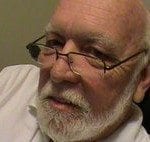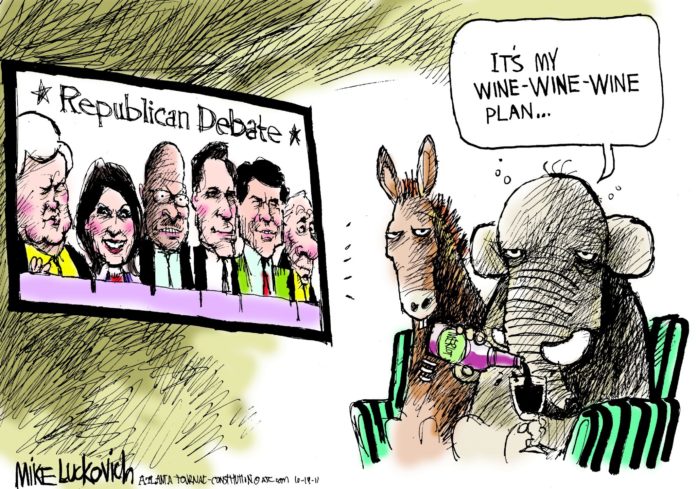BY RICHARD L. FRICKER
 Following the Republican nominating process, the debates in particular, it is not hard to conjure up the image of people in a bar at 1 a.m. arguing over the best ever rock n’ roll song. What these candidates have managed to produce is an image of a vengeful, self-serving America void of compassion and on its way to losing what little moral cachet is left in this republic.
Following the Republican nominating process, the debates in particular, it is not hard to conjure up the image of people in a bar at 1 a.m. arguing over the best ever rock n’ roll song. What these candidates have managed to produce is an image of a vengeful, self-serving America void of compassion and on its way to losing what little moral cachet is left in this republic.
Whether Herman Cain is suggesting Mexicans entering the country illegally be summarily executed; Ron Paul telling the world that if you can’t afford medical care you deserve to die; publicly berating a member of the U.S. military in a combat zone for his sexual orientation; Rick Perry, without a second thought, presiding over the execution of 243 Texas inmates; or blaming the unemployed for the current economic crisis, this all presents a grave and dark picture of what we have allowed ourselves to become.
All of this begs two questions: When did America come to embrace blame and the culture of death? Is this really America?
Twice Cain has suggested summary executions to prevent Mexicans from crossing our borders, the latest being a lethally electrified fence. That a presidential candidate would suggest killing those seeking honest work to support their families in a Third World country somehow seems contradictory to the America dream. Unfortunately there are those who embrace Cain’s idea.
Earlier this week I watched as a middle-class, college-educated, home-owning American not only voiced his support for Cain’s idea, but waved his hands in the air and yelled, “Liberals just don’t get it – you break our laws and come here illegally, you die.”
Cain said he was only joking. Hispanic America isn’t laughing.
When Paul was presented with the scenario of someone unable to afford medical insurance or pay they hospital bills, the crowd shouted, “Let him die.” Paul, lacking humanity or bound by ideology, said nothing.
I recalled Jimmy Strader, a musician friend who, at the age of 54, died of cancer. Musicians can seldom afford insurance; it is too expensive and their incomes too shaky to make the obligation.
Jimmy, a hardworking, talented, self-respecting American, died impoverished and somewhat ashamed. He had been unable to pay the medical bills he felt he owed.
He had sold all his possessions, even done without utilities at times, trying to pay his medical bills. He finally gave up on the debt and began trying to stay alive. No politicians came to visit; there was only red tape as the hospital worried about getting its money.
When he died? There was, and still is, only sorrow that a good person and a wonderful talent had left us behind.
Before he died Jimmy asked my wife and me to care for his cat of 18 years, Max. It has been two years now. Sometimes, watching Max staring into space, I can’t help but feel he still misses Jimmy. I know we do.
That is why hearing the crowd cheer at the Paul question leaves a feeling of disgust, anger and pity.
The serviceman whom the crowd booed when he asked about “Don’t Ask, Don’t Tell” left me with a couple of thoughts about America and how it has evolved.
First I thought about those long days and nights on “Yankee Station” in the Gulf of Tonkin in 1964-65. There were men on the ship whom we suspected, or knew, were gay. But they were our shipmates.
“Shipmate” is hard to describe to someone who has not lived on a man-o-war. Possibly the best analogy is a quote from Dashiell Hammett’s 1930 work the Maltese Falcon, when Sam Spade says, “It doesn’t make any difference what you thought of him. He was your partner … ”
Regardless of what we knew or thought we knew, each and every member of the ship’s crew, whether working airstrikes into North Vietnam or running silently down the coast of China, lived up to the words of John F. Kennedy as seen in the plaza behind the National Archives building:
“Any man who may be asked in this century what he did to make his life worthwhile … can respond with a good deal of pride and satisfaction, ‘I served in the United States Navy.’”
The other thought was more direct: Is the oath to “protect and defend” the Constitution any less meaningful depending on the sex of the person the oath taker may love? Is the death of a gay or lesbian combatant any less painless than that of a heterosexual? Are they missed less by their fellows and family?
The booing was disgraceful. The silence of the Republican candidates was shameful.
On Feb. 5, 2003, Colin Powell told the U.N. Security Council the Iraqi regime had used chemicals on prisoners. He said, “An eyewitness saw prisoners tied down to beds, experiments conducted on them, blood oozing around the victims’ mouths, and autopsies performed to confirm the effects on the prisoners. Saddam Hussein’s humanity – inhumanity has no limits.”
Shortly thereafter we invaded Iraq to rid that country of its “inhumanity.”
During the first debate when it was mentioned that Rick Perry had presided over 243 executions, during which the inmate was strapped to a bed and injected with chemicals, the crowd applauded. No one on the questioning panel or other candidates suggested Perry was inhumane. Except for the applause, the silence was deafening.
There is a young woman of my acquaintance; she is 29 years old, college degree in International Business, bilingual [English-French, and holds an SEC Series Seven license. She was, until recently, a stockbroker for a large international brokerage house. She and six of her colleagues were laid off for not being able to sell stock packages to young people in a down economy.
I would ask how they are root causes of the current employment and financial crisis? You can’t sell to people who don’t have money, or won’t turn lose of their money because they worry about getting laid off.
Blaming the unemployed for unemployment because a multinational moved jobs overseas, or that somehow they caused banks to make questionable loans and then play hide-n-seek with the paperwork, is sophomoric at best and makes hypocritical sound like a virtue.
Is there anyone in this country who does not know someone out of work? Do they really think their relatives, neighbors, former co-workers have in any way caused the current set of economic or fiscal problems?
Based on personal experience it is hard to find reason and order as to why this current crop of candidates is even getting air time, much less being considered as serious possibilities to actually run the country – have their finger on the button so to speak.
Is this America? Is this current bunch the best the opposition party has to offer?
How did this GOP “Who’s on First” become part of the national dialogue? When did shame leave home and expediency move in?
The bottom line is, only the most cruel and disingenuous are laughing at Cain’s jokes. Only the heartless want people to die because they are poor. Only the ghouls think killing is a game. And it makes no difference whom anyone sleeps with as long as they do their job, work and play well with others. How can an unemployed person cause an employment crisis?
What does make a difference is the silence. Why are usually strong, honest, even patriotic politicians on both sides of the aisle, social and religious leaders not coming out en masse and saying it is time to stop this foolishness and get down to the business of fixing the nation?
America must decide who it is and what it wants to become. There are people in the streets demanding action.
– Richard L. Fricker lives in Tulsa, OK and is a regular contributor to The Oklahoma Observer. His latest book, Martian Llama Racing Explained, is available at http://www.richardfricker.com.








